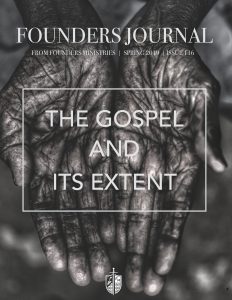All the previous chapters of the 1689 Baptist Confession of Faith (hereafter BCF) reflected the Westminster Confession of Faith (1646). At chapter twenty, however, the Baptists inserted a completely distinct unit taken from the Savoy Declaration of Faith and Order (1656).1
As the title stated, this chapter of the BCF addressed the Gospel, Gospel grace, and the extent of Gospel grace. From general to specific, the topics naturally lead to what is the chief element of the topics–the extent of Gospel grace.
“Extent” has the meaning of “the space or degree to which a thing extends; length, area, volume, or scope: . . . something extended, as a space; a particular length, area, or volume; something having extension.”2 The “extent” of Gospel grace addresses the idea of “How far does the Gospel reach?” or “To whom or where does the Gospel reach?” This chapter of the BCF addresses those questions.
Paragraph one summarizes the Gospel promise remedying the broken covenant of works. Paragraph two addresses the means by which the Gospel promise is generally revealed and the limitations of that revelation. Paragraph three speaks to God’s sovereignty in the general dispersion of the Gospel. Paragraph four further distinguishes the special revelation of the Gospel in Scripture from the particular application of the Gospel by the Holy Spirit.
This article addresses the first two of those paragraphs. The saving Gospel of grace is the only alternative to the broken covenant of works. Furthermore, this Gospel of grace is revealed only in God’s Word. This article will progress through a quote of each paragraph, a commentary exposing principles from each paragraph, and conclude with some practical applications for contemporary believers.
WORKS OR GRACE?
Emboldened above all the schemes of the myriad religions addressing the question “How can one appease the God/gods?” are only two possible alternatives: WORKS or GRACE. Especially is it so in true religion. One must either earn, by his actions, God’s pleasure, or God must, by His actions, satisfy Himself for the benefit of sinners.
The covenant of works and the covenant of grace are contrasted at various points in the London Confession. “Covenant of works” appears three times. Twice the term refers directly to the law and the third, here, is God’s agreement relative to man’s abstinence from the fruit of the tree.
“Covenant of grace” appears five times in the Confession. Every occurrence relates the covenant of grace to some aspect of salvation: conversion (7.23); saving faith (14.2); repentance (15.2); preservation (15.5); or perseverance (17.2).
The signers of the 1689 Confession of Faith knew well the “Works-or-Grace” alternatives and purposefully championed the latter. Paragraph one of Chapter 20 clearly noted the alternatives.4
Commentary
The covenant of works bound Adam and Eve to only one simple restraint: don’t eat the fruit of the tree of the knowledge of good and evil. That covenant stood or fell based upon Adam’s works—his performance and obedience. Adam must perform; he must work. Furthermore, he must work for all his descendents—for all humans. The covenant included his working as the head of the race. His obedience or disobedience thereto affected not only his own person but the race of men as whose head he acted.
Adam broke that covenant when he ate of the forbidden tree. Other consequences attended breaking the covenant, but the Confessors referenced only the chief benefit thereof–life. The broken covenant became “unprofitable unto life.” Once broken, the covenant of works could never again offer any possibility of its major benefit—life.
God’s gracious and loving response to the broken covenant was to make a new covenant—the covenant “of promise.” The promise included several elements.
First, the promise did not rest upon the required performance of man. It requires no performance. It is reasonable to expect that a post-fallen man would be even less prone to fulfill a second works-based covenant than the pre-fallen man to fulfill the first works-based covenant.
Second, the promise was Christ Himself—a person who would fulfill same. The Confessors correctly interpreted the “seed of the woman” as “Christ.” One may easily see in the “Christ” title a reference to the deity of the promised One.
Third, the promise was a human—a kinsman–descended from the woman. Here may be seen the human nature of the promised deliverer–an able kinsman acting on behalf of an unable kinsman.
Four, the promise targeted the elect–a segment of sinners. While Genesis 3:15 does not specifically designate particular humans, it targets a particular person–Christ Himself and the particular persons as considered “in” Him.
Five, the promise includes the means by which God will effect its fulfillment. A “promise,” by virtue of its nature, is an obligation which fulfillment God takes upon Himself. Consequently, the promise must include all the means necessary to deliver same to its intended objects.
Six, the means of accomplishing the promise are included in the promise and clearly identified. A promise must be sure and certain to be fulfilled—i.e. effectual. (1) The promise will include a “calling.” A “caller” will communicate with a “called” in a manner actually and certainly effecting the intended purpose of the promise. (2) The promise includes a sure and certain “birthing”—i.e. regeneration—of its intended objects. (3) The promise includes a sure and certain repentance by its intended objects. (4) The promise includes a sure and certain faith from its intended objects.
Seven, the promise constitutes the “substance” of the Gospel. The Confessors recognized that revelation would progressively show further aspects of the Gospel. However, this promise in Genesis 3:15 contained the substance of the Gospel—an able descendent would correct that gone terribly wrong.
Eight, the promise is effectual unto the ends designed—the conversion and salvation of sinners. The success of the promise rests entirely upon the one who made same. This promise is not simply God saying “I’ve got an idea which would really be great if I could just somehow get it to work.” Nor is God saying “I really wish I could do something to correct this.” This plan is not simply drawn up and subject to modification along the way. It’s not just a good idea whose fulfillment is uncertain. It is not a possibility which might fail. It is not a plan which sometimes works.
It is a plan which every part or process from its initial design to its accomplished end includes every essential to its accomplishment. It’s a promise. It’s God giving His word. If He can’t do this, He must forfeit His title. Every sinner who has been foreknown, predestinated, called, and justified will be glorified (Rom. 8:29-30). The Gospel works every time, all the time, and for all time because it is the promise of a God who cannot lie.
Nor is this Gospel a scheme which requires any supplementation of human methodology. Its success does not depend upon any human ability, willingness, or actions, either within the sinner himself or human instruments or institutions. The success of this promise is not contingent upon the actions of any person other than God Himself. He personally guarantees its success and its certainty. The promise itself includes all the necessary methodology to effect same.
Nine, the promise is a promise of grace. Contrary to the performance required in the covenant of works, the promise is wholly of grace. Being in its nature “of grace,” it excludes works. Whatever human actions appear in the fulfillment of this promise, those actions themselves are included and guaranteed in the promise itself. Otherwise, the promise cannot be a “grace” promise.
Paul expressed the mutual exclusivity of grace and works: “And if by grace, then [is it] no more of works: otherwise grace is no more grace. But if [it be] of works, then is it no more grace: otherwise work is no more work” (Rom 11:6). Grace contains no works; works contain no grace. God’s grace and human works do not mix in the scheme of this Gospel promise. If “not of works” (Eph. 2:10) means anything at all, it means that grace and its accompanying salvation are not of works.
Some Applications Relative to Works or Grace
I propose two applications to this brief consideration of works or grace. Both the applications are stated in the form of questions for the reader’s consideration. Space limitations disallow answering the questions, but all of them demand a contemporary answering.
The first application speaks to the works-or-grace principle in our preaching. We make much, and we should, about preaching a Gospel of grace alone, without any mixture of works. How, though, can we successfully refute a charge of preaching a “salvation-by-works” message when we preach that a willingness to be saved, repentance toward God, and faith toward the Lord Jesus, or even the act of preaching itself, are acts which sinners or saints must “do” in order to be saved or to assist God in saving sinners? Where is the grace in making salvation contingent upon these acts?
The second application speaks to the works-or-grace principle in our ministries. We must be careful that we do not fall from a doctrine of grace into a confidence that the wisdom and talent with which we use legitimate means and devise others effects the work of salvation and the growth and upbuilding of the church. Though the pulpit ministry is primal, I’m thinking particularly about preaching, personal witnessing, disciple-making, planting, growing, maintaining, and/or revitalizing churches. I’m thinking about attendance, baptisms, and budgets. I’m thinking about our children/youth/family ministries, any of our multiple Bible study groups, and our varied “fellowship” actions.
How can we successfully refute a charge of a “ministry-by-works” system when we “tip our hats” to what God does in grace and quickly move to the main theme of the venue—“what you can do to make it happen.” We’ve a plethora of “how-to” experts, books, conferences, websites, blogs, sermons, statistical surveys, and studies on the topics of “evangelism,” “church growth,” “church planting,” and/or “church revitalization.”
These “how to” venues often follow the theme “This is how we did it (planted…grew… revitalized our church) and this is how you can do it.” Or the venue may say “These (4…5…6…9…20) factors characterize churches that are biblical…reaching young families…growing…being revitalized. Reproduce these characteristics in your church and you’ll have a New Testament, growing, thriving, restored-to-life church.” Where did we ever get the idea that theology can be so central while methodology matters little at all, that theology remains stable while methodology must change with every cultural shift?
Where is the venue which focuses upon the idea that “Just as the very best action you can perform will not make you right with God, so the very best action you can perform will not make your group of people into a Gospel church. But God, by His grace alone and in his role as Lord of the church, operates to effect His will in His churches.
How is a testimony of “I did this to produce a Gospel church” any different from a testimony of “I did this to be saved”?
20.2 GOSPEL REVELATION: GENERAL OR PARTICULAR?
How does sinful man learn about this promise of Christ in the Gospel? Paragraph two of Chapter 20 addressed the means by which the Gospel is revealed. Like paragraph one, paragraph two presented two alternatives. The two alternatives here are general revelation or special revelation.5
Commentary
Paragraph two of Chapter 20 distinguishes between general and special revelation relative to the Gospel. General revelation is God’s showing His person and works to all people everywhere of all times. Special revelation, on the other hand, is God’s showing particular aspects of his person and works to particular persons on particular occasions. Several specific principles may be seen in this paragraph.
First, general revelation includes God’s created order and God’s providential workings as enlightened by nature.
Second, neither creation nor providence enable the discovery of Christ. As wonderful and destructive as is creation, and while it regularly testifies to God’s existence and power, calls its observers to worship and repentance, creation says nothing about Jesus or the Gospel. God’s providence is seen in His sun shining on the good and the evil, His rain falling upon the unjust and the just (Matt. 5:45), and sets the times and boundaries of all the nations (Acts 17:26). As mysterious as those dealings of God with mankind are, they show neither Christ nor the Gospel.
Third, man’s natural reason does not enable the discovery of Christ. If “nature” is used to denote the created order alone, the Confessors would be redundant in adding “the enlightenment of nature.” The best alternative would see the phrase as the rationality characterizing the pre-fall image of God contrasted with the disabled enlightenment remaining in the post-fall image. As wonderful as is man’s mind, the discovery of Christ and His Gospel thereby lies in the nether regions of impossibility.
Sam Waldron suggested that the Confessors may reflected a Puritan-anticipated developing Deism.6 What appeared full-grown in Deism, however, was no more than the standing error of the sufficiency of human ability to discover and experience salvific truth. Whatever the case, this paragraph certainly refutes the sufficiency of general revelation and natural theology, and asserts the necessity of special revelation in redemption.
Four, creation and providence enlightened by nature do not enable the discovery of Christ even in a general or obscure way. They cannot even make Christ and His Gospel a foggy apparition of possibility.
Five, creation nor providence provide sinners no ability to saving faith or repentance. The natural state of sinners include no abilities to attain either repentance or faith. The manifold acts of God’s providence include no abilities to attain either repentance or faith. The Confessors clearly denied to fallen man the capability of Gospel repentance and Gospel faith.
Six, the revelation of Christ’s Gospel in the Word of God heightens the destitution of sinners. How could sinners be “worse off” than their destitution of any knowledge toward repentance or faith in nature or providence? Their case can only be made more destitute by the revelation of Christ’s Gospel in the Word of God. This is exactly what Jesus meant when he said to the self-righteous, truth-rejecting Pharisees “If I had not come and spoken unto them, they had not had sin: but now they have no cloke for their sin” (John 15:22).
Seven, said revelation essential to sinners’ ability is provided abundantly in the Word of God. This is the Confessor’s positive to the negatives of general revelation and providence. What they cannot reveal is revealed and revealed abundantly in God’s Word.
Selected Application
Two paramount applications may follow this paragraph. First, our ministries must place prominent emphasis up on the Word of God. We must study, rightly divide, teach, preach, explain, quote, read (both publicly and privately), meditate upon, memorize, and publish Scripture. Since the Gospel of Christ is so essential in God’s economy and is revealed only in God’s Word, then all our ministries should be evaluated singularly upon whether or not those ministries are Bible-centered. If Scripture has final authority, our final authority for doing anything we do must come from Scripture.
Second, we must place supreme confidence in the Word of God. Is our greatest confidence in our homiletical skills, our oratorical skills, our rhetorical skills, our communication skills, our presentation skills, our lessons, our sermons, our evangelistic presentation, our conference skills, our organization skills, our marketing skills, and/or our writing skills? Or does our confidence lie in God’s Word, about which He said, “So shall my word be that goeth forth out of my mouth: it shall not return unto me void, but it shall accomplish that which I please, and it shall prosper [in the thing] whereto I sent it” (Isa. 55:11)?
NOTES:
1 Center for Reformed Theology and Apologetics, “20 Of the Gospel, and of the Extent of the Grace thereof” in “The Savoy Declaration of Faith and Order 1658” (1996-2017), accessed January 17, 2018, http://www.reformed.org/documents/Savoy_Declaration/savoy2.html#twenty.
2 “Extent” Dictionary.com. Dictionary.com Unabridged. Random House, Inc., accessed March 7, 2018, http://www.dictionary.com/browse/extent.
3 The method used herein to denote the chapters and paragraphs of the Confession text. “7.1” is “Chapter 7, paragraph 1).
4 Center for Reformed Theology and Apologetics, “20. Of the Gospel and the Extent of Grace thereof,” in “The Baptist Confession of Faith (1689) w. Scripture Proofs” (1996-2017), accessed January 17, 2018, http://www.reformed.org/documents/baptist_1689.html#Ch. 20. The text reads:
5 The covenant of works being broken by sin, and made unprofitable unto life, God was pleased to give forth the promise of Christ, the seed of the woman, as the means of calling the elect, and begetting in them faith and repentance; in this promise the gospel, as to the substance of it, was revealed, and [is] therein effectual for the conversion and salvation of sinners. (Genesis 3:15; Revelation 13:8).
6 Center for Reformed Theology and Apologetics, “20. Of the Gospel and the Extent of Grace thereof,” in “The Baptist Confession of Faith (1689) w. Scripture Proofs” (1996-2017), accessed January 17, 2018, http://www.reformed.org/documents/baptist_1689.html#Ch. 20. The paragraph reads:
7 This promise of Christ, and salvation by him, is revealed only by the Word of God; neither do the works of creation or providence, with the light of nature, make discovery of Christ, or of grace by him, so much as in a general or obscure way; much less that men destitute of the revelation of Him by the promise or gospel, should be enabled thereby to attain saving faith or repentance. (Romans 1:17; Romans 10:14,15,17; Proverbs 29:18; Isaiah 25:7; Isaiah 60:2, 3).
8 Sam E. Waldron. A Modern Exposition of the 1689 Baptist Confession of Faith (Darlington: Evangelical Press, 2013), 302-3. Waldron Sam E. A Modern Exposition of The 1689 Baptist Confession of Faith. Darlington: Evangelical Press, 2013.


















